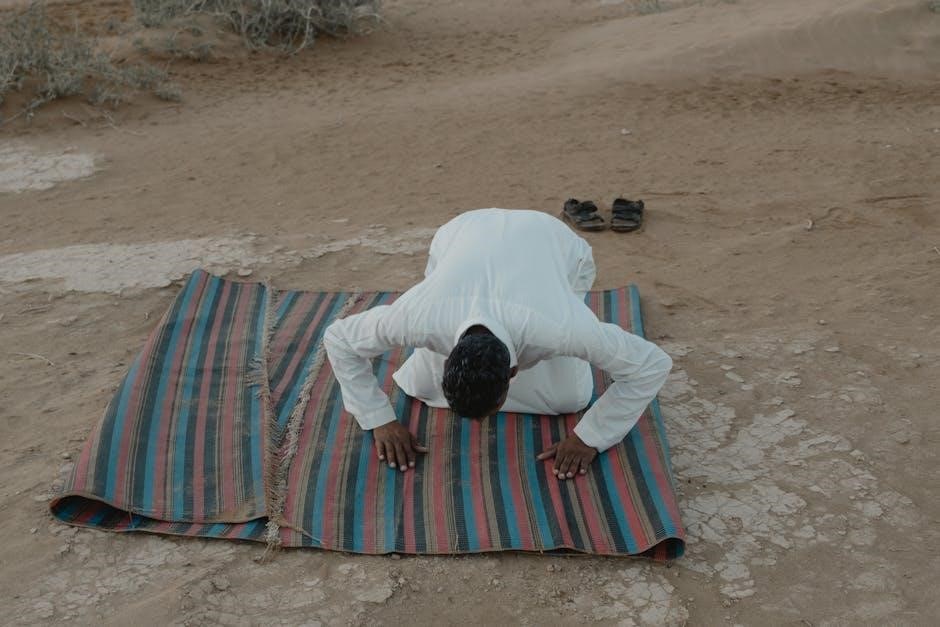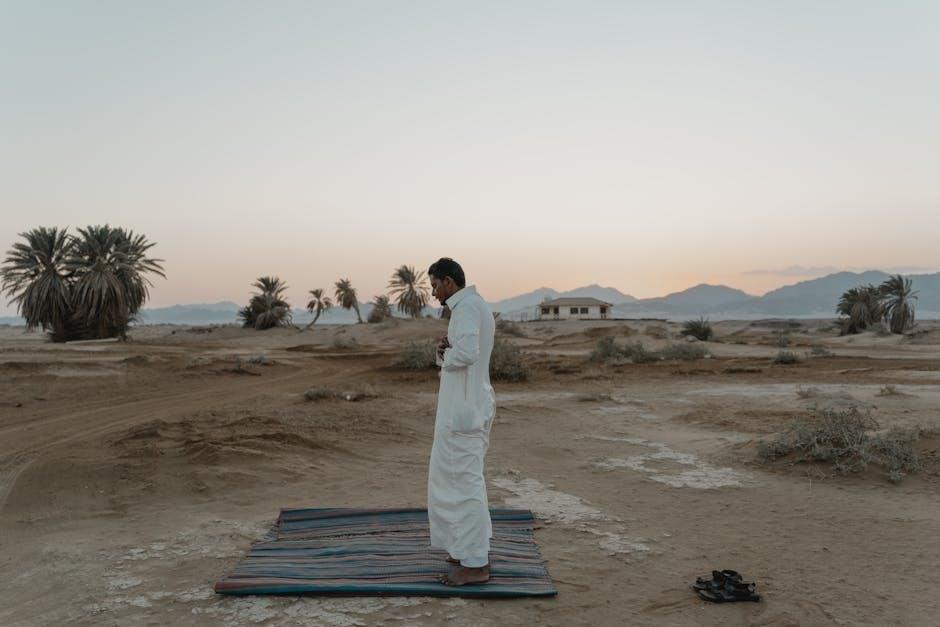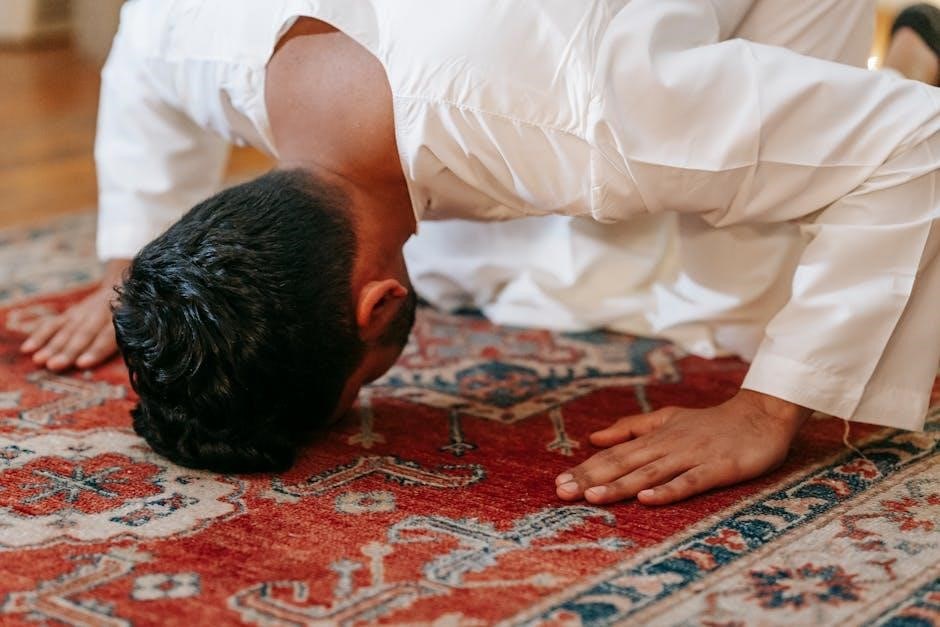Dua after Salah is a vital Islamic practice‚ offering a structured way to connect with Allah‚ seek blessings‚ and reflect on faith‚ deeply rooted in Muslim culture and worship routines‚ fostering spiritual growth and mindfulness in daily life․
What is Dua After Salah?
Dua after Salah refers to the supplications and prayers recited following the completion of Islamic formal prayers․ These duas are specific‚ heartfelt invocations seeking Allah’s blessings‚ forgiveness‚ and guidance․ They are deeply rooted in Islamic tradition and are often recited using memorized phrases or guided resources‚ such as PDFs‚ which provide accurate Arabic texts‚ translations‚ and interpretations․ Dua after Salah is a meaningful way to connect with Allah‚ express gratitude‚ and reflect on one’s faith‚ making it an essential practice for spiritual growth and daily worship․
Importance of Dua in Islamic Prayer
Dua after Salah holds profound significance in Islamic worship‚ serving as a direct communication with Allah․ It is a Sunnah encouraged by the Prophet Muhammad (peace be upon him)‚ emphasizing the importance of expressing gratitude‚ seeking forgiveness‚ and requesting guidance․ Dua after Salah strengthens one’s spiritual connection‚ fostering humility and reliance on Allah․ It is a moment of vulnerability and sincerity‚ where believers can reflect on their deeds and aspirations․ By incorporating Dua into post-prayer routines‚ Muslims cultivate a deeper sense of faith‚ ensuring their supplications are heartfelt and aligned with Islamic teachings․
Benefits of Reciting Dua After Salah
Reciting Dua after Salah offers numerous spiritual and emotional benefits‚ fostering a deeper connection with Allah․ It provides an opportunity for seeking forgiveness‚ expressing gratitude‚ and requesting divine guidance․ Dua after Salah strengthens faith‚ enhances focus‚ and cultivates sincerity in worship․ It also serves as a means of emotional healing and mental clarity‚ allowing individuals to reflect on their actions and aspirations․ By prioritizing Dua post-prayer‚ Muslims can experience spiritual growth‚ increased mindfulness‚ and a sense of peace in their daily lives‚ aligning their supplications with Islamic values and teachings․
Recommended Dua After Salah
Recommended Dua after Salah includes seeking forgiveness‚ guidance‚ and protection‚ such as the Dua for Jannah‚ Dua for protection from hellfire‚ and Dua for beneficial knowledge․
Most Commonly Recited Dua After Salah
Among the most commonly recited Duas after Salah are the supplications taught by the Prophet Muhammad (peace be upon him)‚ such as the Dua for forgiveness‚ the Dua for seeking Paradise‚ and the Dua for protection from harm․ These supplications are deeply rooted in Islamic tradition and are often memorized and recited by Muslims worldwide․ They emphasize themes of seeking Allah’s mercy‚ guidance‚ and blessings‚ and are considered essential for spiritual growth and mindfulness․ Regular recitation of these Duas fosters a strong connection to faith and promotes a sense of gratitude and humility in daily life․
Dua for Forgiveness and Mercy
Dua for forgiveness and mercy is a cornerstone of Islamic worship‚ emphasizing the seeker’s humility and devotion․ The Prophet Muhammad (peace be upon him) taught specific supplications‚ such as Astaghfirullah and longer‚ comprehensive prayers that combine seeking pardon with requests for divine compassion․ These Duas highlight the importance of acknowledging human imperfection and relying on Allah’s infinite mercy․ Regularly reciting these supplications after Salah strengthens one’s spiritual connection‚ fostering a deeper sense of gratitude and humility․ They serve as a powerful means to seek Allah’s forgiveness and attain His blessings in this life and the hereafter․
Dua for Guidance and Protection
Dua for guidance and protection is a deeply revered practice in Islam‚ seeking Allah’s divine direction and safeguarding against harm․ These supplications often include well-known prayers‚ such as the Dua for Guidance and Dua for Protection from Harm‚ which emphasize trust in Allah’s wisdom and mercy․ Reciting these Duas after Salah strengthens one’s faith and provides solace‚ helping believers navigate life’s challenges with confidence and reliance on divine providence․ They serve as a powerful reminder of Allah’s ever-present guidance and protection‚ fostering a sense of security and trust in His plan․

How to Incorporate Dua After Salah into Daily Routine
Consistency is key; allocate time post-Salah for Dua‚ use Dua after Salah PDF guides‚ and set reminders to stay committed to this spiritual practice․
Best Practices for Reciting Dua Post-Prayer
To maximize the impact of Dua after Salah‚ ensure you face the Qiblah‚ maintain proper posture‚ and focus on the words․ Use a Dua after Salah PDF to guide accurate recitation‚ ensuring the supplications align with Islamic teachings․ Avoid distractions by finding a quiet space and maintaining humility․ Recite with sincerity‚ reflecting on the meanings to deepen your connection․ Consistency is crucial; integrate Dua into your daily routine immediately after each prayer․ This practice fosters spiritual growth and strengthens your bond with Allah․
Understanding the Proper Etiquette
Proper etiquette for Dua after Salah involves preparing mentally and physically․ Ensure you face the Qiblah‚ maintain cleanliness‚ and wear appropriate attire․ Raise your hands humbly‚ palms facing upwards‚ and recite with clarity․ Avoid distractions like talking or fidgeting․ Use a Dua after Salah PDF guide to learn correct phrases and avoid mistakes․ Show respect by bowing your head slightly and speaking softly․ Keep your heart focused on Allah‚ avoiding worldly thoughts․ This etiquette reflects reverence and sincerity‚ essential for the acceptance of Dua․

Dua After Salah PDF Resources
Dua after Salah PDF resources provide convenient access to authentic supplications․ These guides include Arabic texts‚ translations‚ and meanings․ Download them from trusted Islamic websites for daily worship․

Popular PDF Guides for Dua After Salah
Popular PDF guides for dua after Salah offer comprehensive collections of supplications․ These resources often include Arabic texts‚ translations‚ and transliterations․ They are widely available online‚ featuring essential duas for forgiveness‚ guidance‚ and daily blessings․ Many guides are carefully curated to ensure authenticity‚ referencing the Quran and Sunnah․ Downloadable from trusted websites‚ these PDFs are ideal for personal use‚ sharing‚ or printing․ They serve as valuable tools for Muslims seeking to deepen their spiritual practice and connect with Allah through meaningful supplications after each prayer․
Where to Find Authentic Dua PDFs Online
Authentic dua PDFs can be found on reputable Islamic websites and platforms․ Trusted sources include the Islamic Foundation‚ Dar-us-Salam Publications‚ and verified Islamic e-libraries․ Many mosques and Islamic centers also provide free downloadable resources․ Platforms like Google Books and Scribd often host verified PDFs․ Ensure to verify the credibility of the source to maintain authenticity․ Searching with terms like “authentic dua after Salah PDF” or “trusted Islamic supplications PDF” can help locate reliable materials for spiritual enrichment and guidance․
Common Mistakes to Avoid

Rushing through dua without focus‚ reciting without understanding‚ and neglecting consistency are common errors․ Ensure sincerity‚ attentiveness‚ and regular practice to maximize spiritual benefits and connection․
Errors in Recitation and Intentions
Common mistakes include rushing through dua without focus‚ reciting without understanding the meaning‚ and lacking proper intention․ Mispronouncing Arabic words and neglecting to articulate each phrase clearly can lead to incorrect recitation․ Additionally‚ some individuals may recite dua mechanically‚ devoid of sincerity or heartfelt connection․ It is essential to approach dua with mindfulness‚ ensuring that both the recitation and intention align with Islamic teachings․ Avoiding these errors enhances the spiritual impact and ensures that dua is performed in the manner prescribed by the Prophet Muhammad (peace be upon him)․
How to Ensure Sincerity in Dua
To ensure sincerity in dua‚ focus on the intention behind your words‚ making sure they stem from a genuine desire to connect with Allah․ Avoid distractions during recitation and maintain a heartfelt connection‚ reflecting on the meaning of each phrase․ Cultivate humility and gratitude‚ recognizing Allah’s mercy and grace․ Seek guidance from the Quran and Sunnah to align your dua with Islamic teachings․ Consistency in practice and a mindful approach will enhance the sincerity of your supplications‚ making them more meaningful and impactful in your spiritual journey․
Cultural and Spiritual Significance
Dua after Salah holds profound cultural and spiritual value‚ reflecting a Muslim’s devotion and connection to Allah․ It embodies the community’s collective faith and humility‚ fostering a deeper spiritual bond and guidance in daily life․
The Role of Dua in Muslim Culture
Dua after Salah is a cornerstone of Muslim culture‚ fostering a deep sense of spirituality and community․ It serves as a collective expression of gratitude‚ forgiveness‚ and guidance‚ strengthening social bonds and cultural identity․ Dua is often recited in unison in mosques‚ homes‚ and gatherings‚ creating a shared spiritual experience․ Its practice is passed down through generations‚ preserving Islamic values and traditions․ PDF resources widely available today help standardize these supplications‚ ensuring their authenticity and accessibility for all‚ thus playing a vital role in maintaining cultural and religious continuity․

Spiritual Growth Through Post-Salah Dua
Post-Salah dua fosters profound spiritual growth by deepening one’s connection with Allah․ It encourages self-reflection‚ gratitude‚ and humility‚ essential for inner development․ Reciting these supplications regularly helps Muslims cultivate mindfulness and sincerity in their worship․ Dua after Salah also serves as a reminder to seek Allah’s guidance and mercy‚ aligning one’s intentions with righteous goals; This practice strengthens faith‚ promotes emotional well-being‚ and nurtures a closer relationship with the divine․ PDF guides on dua after Salah provide structured supplications‚ making it easier for believers to embrace this spiritual practice consistently and meaningfully․

Tips for Effective Dua
Focus on sincerity‚ concentrate during recitation‚ and use proper etiquette․ Seek forgiveness‚ express gratitude‚ and prioritize heartfelt intentions for impactful supplications․
Focus and Concentration in Dua
Maintaining focus and concentration during dua after salah is essential for its acceptance․ Distractions should be minimized to ensure sincerity and heartfelt supplications․ Understanding the meaning of the dua enhances concentration‚ making it more impactful․ Consistency in practice helps develop this habit‚ fostering a deeper connection with Allah․ Proper preparation‚ such as having the right intention and being in a calm state‚ aids in maintaining focus․ Adhering to recommended times and positions can also enhance concentration‚ allowing for a more meaningful and effective supplication experience․

Using Dua as a Means of Self-Reflection
Dua after salah serves as a powerful tool for self-reflection and personal growth․ Engaging in meaningful supplications allows believers to evaluate their intentions‚ actions‚ and spiritual state․ By expressing remorse for shortcomings and gratitude for blessings‚ individuals can foster a deeper understanding of their relationship with Allah․ Regular self-assessment through dua encourages accountability‚ humility‚ and a commitment to improvement․ This practice strengthens one’s connection with Allah and promotes a more conscious and purposeful lifestyle‚ aligning daily actions with divine guidance and values․
The Role of Intention in Dua
Intention is vital in dua‚ making it heartfelt and pure․ It ensures supplications align with divine will‚ fostering sincerity and purpose․
How Intention Enhances the Power of Dua
Intention is the cornerstone of dua‚ making it sincere and impactful․ It focuses the heart and mind‚ ensuring supplications align with divine will․ A clear intention purifies the purpose‚ transforming dua into a meaningful dialogue with Allah․ By setting a sincere intention‚ believers demonstrate humility and devotion‚ which Allah rewards abundantly․ PDF guides on dua after salah often emphasize the importance of intention‚ teaching how it strengthens the spiritual connection and enhances the effectiveness of supplications․ A heartfelt intention is key to unlocking the power of dua and receiving divine mercy and guidance․

Dua for Forgiveness and Purity
Dua for forgiveness and purity seeks Allah’s mercy and cleansing․ Commonly recited after salah‚ it reflects humility and the believer’s desire to draw closer to Allah․
Seeking Allah’s Forgiveness After Salah
Seeking Allah’s forgiveness after salah is a deeply rooted practice in Islam․ Muslims are encouraged to recite specific supplications‚ such as “Allahumma antas-salam” and “Astaghfirullah”‚ to express remorse and seek purification․ These duás emphasize humility and sincerity‚ reflecting a believer’s commitment to spiritual growth․ Regularly seeking forgiveness after prayer helps purify the heart and strengthens the bond with Allah․ It also serves as a reminder of the importance of accountability and the pursuit of righteous deeds․ This practice is highly recommended in Islamic teachings and is a means of attaining divine mercy and peace․ By incorporating these duás‚ one can seek Allah’s pardon and strive for a sin-free life․
Dua as Part of Daily Worship
Dua after salah is a vital part of daily worship‚ fostering a deeper spiritual connection and mindfulness․ Consistency in reciting these supplications reflects a sincere commitment to faith․
Integrating Dua into Your Worship Routine
Incorporating dua after salah into your daily worship routine enhances spiritual discipline and strengthens your bond with Allah․ Consistency is key; allocate time post-prayer for sincere supplications‚ using pdf guides for authenticity․ Understand the meanings to deepen your connection and ensure your heart is present․ Regular practice fosters mindfulness and gratitude‚ transforming dua into a meaningful dialogue with the Almighty․ This consistent devotion nurtures spiritual growth and aligns your actions with divine guidance‚ making dua an indispensable part of your worship regimen․

Seeking Guidance Through Dua
Dua after salah serves as a powerful means to seek divine guidance‚ enabling Muslims to navigate life’s challenges with clarity and righteousness‚ as supported by authentic PDF resources․
Using Dua to Seek Righteousness
Dua after salah is a profound way to seek righteousness‚ fostering a deeper connection with Allah and aligning one’s actions with His will․ Authentic PDF guides provide structured duas that emphasize moral integrity‚ humility‚ and devotion․ These supplications‚ rooted in Islamic teachings‚ help believers cultivate sincerity and piety․ By regularly reciting such duas‚ Muslims can refine their character and strive for spiritual excellence‚ ensuring their deeds reflect divine guidance and righteousness in all aspects of life‚ as supported by reliable dua after salah PDF resources․
Dua after Salah is a vital spiritual practice‚ deeply rooted in Islamic tradition․ Utilizing authentic PDF guides enhances understanding and implementation‚ fostering a stronger connection with Allah and enriching one’s worship journey․
Final Thoughts on the Importance of Dua After Salah
Dua after Salah is a profound act of worship that strengthens one’s relationship with Allah․ It serves as a means of expressing gratitude‚ seeking forgiveness‚ and requesting guidance․ By incorporating authentic duas from reliable PDF resources‚ believers can ensure their supplications are aligned with Islamic teachings․ Consistency in post-prayer dua fosters spiritual growth‚ enhances sincerity‚ and brings comfort to the heart․ Embracing this practice with focus and intention can lead to a more fulfilling and righteous life‚ as it aligns one’s desires with Allah’s will․
